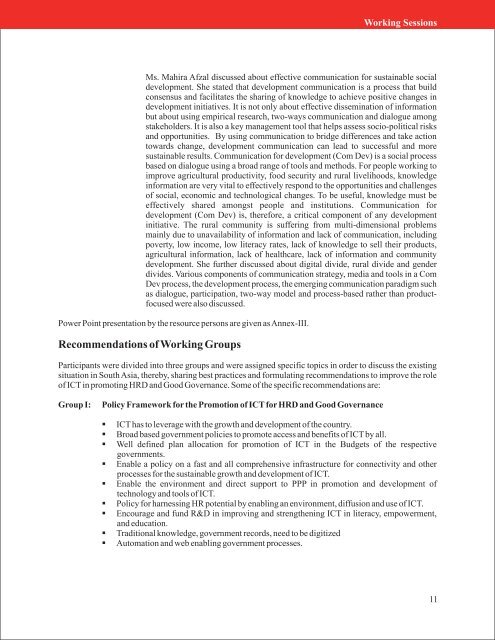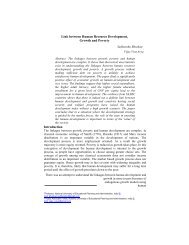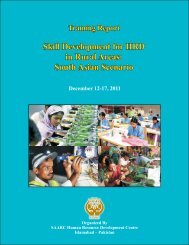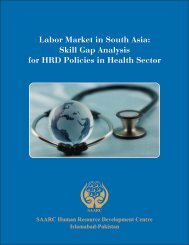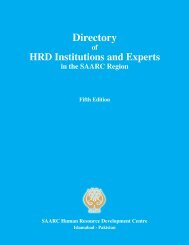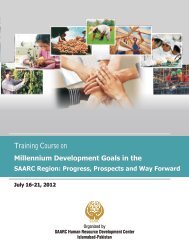Here - SAARC Human Resource Development Centre
Here - SAARC Human Resource Development Centre
Here - SAARC Human Resource Development Centre
- No tags were found...
You also want an ePaper? Increase the reach of your titles
YUMPU automatically turns print PDFs into web optimized ePapers that Google loves.
Working SessionsMs. Mahira Afzal discussed about effective communication for sustainable socialdevelopment. She stated that development communication is a process that buildconsensus and facilitates the sharing of knowledge to achieve positive changes indevelopment initiatives. It is not only about effective dissemination of informationbut about using empirical research, two-ways communication and dialogue amongstakeholders. It is also a key management tool that helps assess socio-political risksand opportunities. By using communication to bridge differences and take actiontowards change, development communication can lead to successful and moresustainable results. Communication for development (Com Dev) is a social processbased on dialogue using a broad range of tools and methods. For people working toimprove agricultural productivity, food security and rural livelihoods, knowledgeinformation are very vital to effectively respond to the opportunities and challengesof social, economic and technological changes. To be useful, knowledge must beeffectively shared amongst people and institutions. Communication fordevelopment (Com Dev) is, therefore, a critical component of any developmentinitiative. The rural community is suffering from multi-dimensional problemsmainly due to unavailability of information and lack of communication, includingpoverty, low income, low literacy rates, lack of knowledge to sell their products,agricultural information, lack of healthcare, lack of information and communitydevelopment. She further discussed about digital divide, rural divide and genderdivides. Various components of communication strategy, media and tools in a ComDev process, the development process, the emerging communication paradigm suchas dialogue, participation, two-way model and process-based rather than productfocusedwere also discussed.Power Point presentation by the resource persons are given as Annex-III.Recommendations of Working GroupsParticipants were divided into three groups and were assigned specific topics in order to discuss the existingsituation in South Asia, thereby, sharing best practices and formulating recommendations to improve the roleof ICT in promoting HRD and Good Governance. Some of the specific recommendations are:Group I:Policy Framework for the Promotion of ICT for HRD and Good GovernanceICT has to leverage with the growth and development of the country.Broad based government policies to promote access and benefits of ICT by all.Well defined plan allocation for promotion of ICT in the Budgets of the respectivegovernments.Enable a policy on a fast and all comprehensive infrastructure for connectivity and otherprocesses for the sustainable growth and development of ICT.Enable the environment and direct support to PPP in promotion and development oftechnology and tools of ICT.Policy for harnessing HR potential by enabling an environment, diffusion and use of ICT.Encourage and fund R&D in improving and strengthening ICT in literacy, empowerment,and education.Traditional knowledge, government records, need to be digitizedAutomation and web enabling government processes.11


